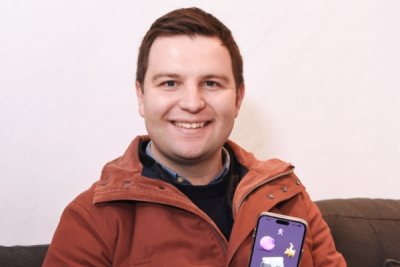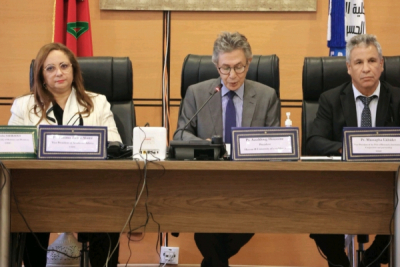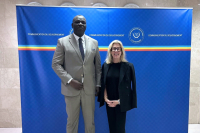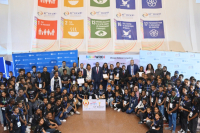She recognizes the difficulties logistics professionals encounter in obtaining loans to fund their operations. To tackle this issue, she's harnessing technology to streamline online loan applications, making the process more accessible and efficient.
Gugulethu Siso, a Zimbabwean marketing expert and entrepreneur, is the founder and CEO of Thumeza, a fintech platform that provides data-driven financing solutions to logistics players across Africa.
Thumeza, established in 2018, initially offered last-mile delivery services for e-commerce sites, small businesses, and retailers in Bulawayo, Zimbabwe. By 2019, it had evolved into a freight platform coordinating a network of small carriers. In 2021, Thumeza shifted its focus to financing logistics operators. The platform now provides loans to small carriers through an online loan management system, offering factoring services and early invoice settlements. It handles the entire lending process for its distribution partners, such as FMCG companies and logistics aggregators, allowing them to concentrate on their core activities.
Siso is also one of the Shouthern African representatives on the Afrikan Youth Business Council, a continental organization uniting private sector entities and institutions led by young people in Africa. In 2015, she co-founded Ninety Nine Investments, serving as CEO until 2017, a company offering retailers comprehensive cart management solutions.
A graduate of the University of Namibia with a Bachelor’s in Strategic Marketing (2015), Siso also participated as a coach in the 2022 Future Females entrepreneurship training program. She is an alumna of the Tony Elumelu Entrepreneurship Program (2018) and a provincial winner of Youth Connekt (2019). In 2020, she was selected for the Academy for Women Entrepreneurs, took part in the Google for Startups Accelerator Africa cohort, and was recognized as one of the Junior Chamber International (JCI) Zimbabwe’s Ten Outstanding Young Persons.
Melchior Koba
Real-time payments meet the growing demand for speed and convenience in financial transactions. As consumer expectations evolve, having access to instant payment solutions becomes increasingly important. This not only benefits individuals but also strengthens trust and loyalty between customers and businesses
Mastercard announced on October 8 that South Africa will be the first market to benefit from its real-time card payment technology, marking a significant step forward in the region’s digital payment landscape. The initiative will enable acquiring banks to process real-time card payments, with plans to extend the service to issuing banks in the future.
Gabriel Swanepoel, Mastercard’s Southern Africa country manager, emphasized the shift towards faster, more efficient payment processing to meet evolving consumer and business expectations. He stated, “By enhancing processing standards and delivering faster clearing and settlement, we aim to support small businesses with better cash flow and enable acquirers to manage liquidity more effectively.”
The company will implement new processing standards, including real-time clearing and more frequent settlement cycles, allowing South African merchants to receive same-day payouts. This initiative follows Mastercard’s recent network enhancements in South Africa, designed to facilitate local transaction processing.
Mastercard is collaborating with ACI Worldwide to help local acquirers adopt real-time transaction standards. The partnership aims to boost liquidity and improve payment experiences for businesses and customers alike.
This rollout is part of Mastercard’s broader strategy to drive digital transformation in cash-heavy regions. The Payments Study Report 2023 by the South African Reserve bank reveals that 98% South Africans use cash for payments. It highlights the significant potential impact of Mastercard's new real-time card payment services.
This initiative could be pivotal in reducing the country’s reliance on cash by offering faster, more secure, and convenient payment options. Given that cash transactions often come with security risks and limited transparency, Mastercard’s real-time payments could accelerate digital payment adoption, promoting financial inclusion and economic efficiency.
Hikmatu Bilali
A former investment banker with a passion for technology and innovation, he transitioned into entrepreneurship, focusing on cutting-edge technologies. He founded a digital bank in his home country.
Schalk Burger (photo) is a South African accountant and entrepreneur. He is the founder and CEO of Xhuma, a digital bank designed to offer its users greater financial freedom.
Founded in 2021, Xhuma provides a range of solutions to South Africans. Through PeerPay, users can send and receive money instantly. The startup's LoyaltyHub centralizes the most attractive loyalty cards and promotional offers while ensuring the security of transactional accounts.
Xhuma also offers SpendSense, which helps users manage their expenses responsibly. With GroupPay, bills can be shared among friends and family. Group Vaults, meanwhile, allows for the management of contributions, savings, withdrawals, and payments without administrative hassle or extra fees. Finally, TravelGenius makes booking flights, accommodations, excursions, and airport shuttles easier for South Africans.
In addition to Xhuma, Burger is also the founder and CEO of Xhuma Talent, an AI-powered platform launched in 2020 to connect talent with corporate job opportunities. Back in 2010, he founded Clothing4children, a charitable initiative focused on collecting clothing donations. In 2014, he co-founded the Samaritan Fund, an organization aimed at addressing South Africa's growing social needs, where he served as director until 2021.
The entrepreneur holds a bachelor’s degree in accounting and law from Stellenbosch University, which he earned in 2017, the same year he obtained a bachelor’s in accounting from the University of Johannesburg. In 2018, he joined Investec, a financial management firm, as an internal auditor.
In 2020, Burger received multiple accolades. Notably, he was a finalist for the CEO of the Year award at Africa Tech Week and the Entrepreneur of the Year award at Startup School Africa. He also won the AppsAfrica award in the Edtech category and was a global finalist for the Global Edtech Startup Awards.
Melchior Koba
The development of e-health in Africa is expected to facilitate access to healthcare for millions of people, even in remote areas. Although the continent lags behind, it is making every effort to bridge this technological gap and improve its healthcare systems.
Togo recently launched the construction of a National Center for Digital Health (CNSD) in its capital; Lomé. Funded by the United Nations Development Programme (UNDP), this initiative aims to improve healthcare accessibility through the use of new technologies.
"The National Center for Digital Health will oversee the operational governance of digital health activities by establishing key elements such as interoperability and project compliance, as well as gathering health data to support epidemiological surveillance," said Aristide Afèignindou Gnassingbé, Minister Health Advisor, Permanent Mission of Togo to the UN in Geneva, and National Coordinator for Digital Health in Togo.
The CNSD launch aligns with the Togo Digital 2025 national strategy. This project, announced in the wake of the Covid-19 pandemic, highlights the importance of integrating ICT into the healthcare sector. Among the planned innovations is telemedicine, a crucial branch of digital health that has become an essential tool. It will facilitate teleconsultation, tele-expertise, remote monitoring, and tele-ultrasound services.
The center is also expected to serve as a platform for developing digital health solutions, strengthening the country’s ability to respond to health crises through automated surveillance systems and optimized management of medical resources. Additionally, it will accelerate the digitization of healthcare infrastructure nationwide, particularly by incorporating electronic medical records and promoting the training of healthcare professionals in new technologies.
Samira Njoya
Last September, Morocco launched its "Digital Morocco 2030" program. Since then, various initiatives have been implemented to achieve the goals outlined in the strategy document.
On Monday, October 7, Hassan II University of Casablanca signed agreements with several tech companies. The goal is to offer students training programs tailored to meet the new demands of the job market in the technology sector.
According to Fatima Zahra Alami (photo, left), the university’s vice president in charge of academic affairs, the partnership aims to provide students with digital skills to complement their academic education. This initiative seeks to align their training with the growing demands of the labor market, where digital transformation plays an increasingly important role.
The initiative is part of the National Plan for Accelerating the Transformation of Higher Education, Scientific Research, and Innovation, launched in February 2022. It aligns with Digital Morocco 2030, which aims to train 20,000 tech professionals by 2026 and 45,000 by 2030. The plan also envisions upskilling around 50,000 individuals for digital careers by 2030.
In this context, boosting the capacity of educational institutions to train more digital talent and scaling up various retraining mechanisms—such as bootcamps, coding schools, and certification programs—are among the key measures taken by Moroccan authorities.
The agreement’s signatories include American tech companies Oracle, Cisco, DXC, and Fortinet, as well as China's Huawei and Moroccan firm NearSecure.
Adoni Conrad Quenum
Establishing data centers enhances Africa’s digital infrastructure. This benefits industries that rely on secure, localized data storage and supports the continent's broader digital economy transformation.
Huawei Technologies has announced its plan to establish a data center in Nigeria to address local data storage needs. This announcement was made by David Olaiya, Huawei Nigeria's Head of Cloud Fintech Business Development, during Nigeria Fintech Week in Lagos, which is taking place from October 8 to 10.
Olaiya revealed that the facility, set to launch on October 31, will enhance data sovereignty and reduce latency for Nigerian businesses. “Huawei’s data centre will allow businesses to keep their data resident in Nigeria; a significant advantage for fintech companies that require stringent adherence to data protection laws,” he said.
The center, ‘Cloud Site,’ will provide dedicated local support and connect to Huawei’s global cloud infrastructure. It will serve as an extension of its existing cloud infrastructure in Johannesburg, South Africa, and will be linked to its data center in Dublin, Ireland.
Establishing the data center signifies an important step forward for the country's digital landscape, offering numerous benefits that align with Nigeria's broader digital transformation goals. This infrastructure is set to support local industries by providing secure, localized data storage, which is crucial for compliance with Nigeria's data protection laws. Additionally, it will help to reduce latency and improve the reliability of digital services - a key factor in enabling industries like fintech, which demand stringent data protection and high-speed connectivity.
Hikmatu Bilali
In the DRC, the telecommunication sector is undergoing significant modernization. To ensure its overall development, the country can rely on strategic partners such as the World Bank, which plays a key role in supporting this transformation.
The International Finance Corporation (IFC) will support the telecommunication sector in the Democratic Republic of Congo (DRC). The decision was announced during a meeting on Tuesday, September 8, between the Minister of Posts, Telecommunications, and Digitalization, Augustin Kibassa Maliba (photo, left), and Mary Porter Peschka (photo, right), IFC’s Regional Director for East Africa.
“We discussed the willingness [of] the International Finance Corporation to support the Congolese government in the development of the telecommunications sector. The telecommunications sector is of paramount importance, both for the DRC and for our group,” said Mary Porter Peschka.
This initiative is part of the DRC's National Digital Plan (Horizon 2025) which makes telecommunications a key sector. The country is already seeing positive effects from this momentum, with mobile phone subscribers increasing by 6.4 million, from 49.8 million in 2022 to 56.2 million in December 2023, according to the Congolese Postal and Telecommunications Regulatory Authority. Meanwhile, mobile market revenues in the DRC reached 11.898 billion CFA francs ($19.9 million) in July 2023, a 9.7% increase compared to the previous year.
The IFC’s support in the DRC will focus on several strategic areas, including strengthening digital skills and developing and modernizing digital infrastructure, among others. The overarching goal is to create a favorable environment for innovation and investment by attracting new private sector players while boosting the competitiveness of local businesses.
Samira Njoya
In the first half of 2024, Moroccan startups attracted $14 million in funding, according to Africa: The Big Deal. The government has also committed to supporting these startups through its national digital strategy.
Moroccan Digital Minister Ghita Mezzour (photo) recently announced a 240 million dirhams (approximately $24.5 million) investment to boost innovation and support local startups. Announced, on October 8th, at the opening of the 6th edition of the African Digital Summit, the investment aims to boost demand for innovative services.
“We have allocated a budget of 240 million dirhams to stimulate domestic demand for innovative services, prioritizing purchases from local startups and giving them access to outsourcing opportunities, so they can export their solutions beyond our borders,” Mezzour stated.
This initiative comes at a time when African startups are increasingly struggling to attract capital. It is part of the "Digital Morocco 2030" strategy, which aims to boost the local tech ecosystem. According to data from Partech Africa, Moroccan startups secured $33 million in 2021, $26 million in 2022, and $93 million in 2023.
State support is expected to strengthen the country’s tech entrepreneurial fabric, stimulate job creation, attract foreign investors, and further solidify Morocco’s position as a regional tech hub.
Adoni Conrad Quenum
He aims to make quality healthcare more accessible to the Congolese population. By leveraging technology, he automates appointment scheduling and patient care.
Emmanuel Epenge (photo) is a Congolese neurologist and entrepreneur. He is the co-founder and CEO of Congo Medika, a health tech startup.
Founded in 2021, Congo Medika offers a platform that connects patients with over 120 healthcare professionals, enabling them to book appointments online with a doctor or a medical practice. The platform also provides home delivery of medications and health advice services.
The "advice" section of Congo Medika features a blog and video content covering a range of health topics. Additionally, a messaging function allows users to share experiences through private messages.
Emmanuel Epenge also works as a physician at the Neuropsychopathology Center in Kinshasa, Democratic Republic of Congo (DRC), where he treats patients with psychiatric disorders (psychoses, neuroses, etc.) or neurological conditions (strokes, meningitis, etc.).
Epenge graduated from the Protestant University in Congo with a medical degree in 2014. Between 2013 and 2014, he practiced at Kinshasa's General Reference Hospital. In 2016, he served as the national coordinator for the Association for the Smile of Mother and Child (ASME) in the DRC.
In 2019, he was one of the winners of the Innovation and Invention masterclass organized by the DRC’s Ministry of Industry.
Melchior Koba
Africa's digital growth faces challenges, including infrastructure disparities, low internet access in rural areas, and limited digital skills among the workforce. Empowering youth through digital education initiatives can help bridge the digital divide and position Africa as a leader in global digital innovation.
Ethiopia and Tanzania hosted hundreds of young innovators gathered for the World Robot Olympiad (WRO) National Competitions on October 4.
Claver Gatete, Executive Secretary of the Economic Commission for Africa (ECA), said "We are thrilled to see Ethiopia’s young innovators competing at such a high level. This competition not only showcases creativity but also demonstrates Africa's potential to lead in technological solutions to our continent’s most pressing challenges."
Held at the United Nations Conference Center in Addis Ababa, Ethiopia, the event featured 100 Ethiopian finalists including 30 female competitors representing 14 STEM centers nationwide. The participants showcased their skills in robotics, artificial intelligence, and sustainability.
In Tanzania, the national competition, hosted at the University of Dar es Salaam, saw 39 students from 12 groups demonstrate innovative solutions to environmental and safety challenges. This year’s World Robot Olympiad theme, "Earth Allies," encouraged young innovators to develop environmentally friendly solutions, underscoring the urgent need for creative approaches to sustainability.
Ethiopia’s Kotebe STEM Center won first place with its ADAPTA-Multipurpose Robot, while Tanzania’s Azania Secondary School took top honors with an Automatic Fire-Fighting Robot. These winners will advance to the global WRO finals in Turkey later this year from November 28 to 30 2024.
For Pren-Tsilya Boa-Guehe, Head of Google Government Affairs and Public Policy, this “partnership with ECA and others aims to provide young African learners with opportunities to explore their curiosities, learn digital skills, and ultimately, be prepared to embrace the 4th Industrial Revolution.”
Supported by the Economic Commission for Africa (ECA), Google, and STEMPower, the event is part of a larger initiative aiming to equip 9,000 African students and 200 teachers with digital skills in AI and robotics across 14 countries on the continent. This aligns with Africa's goal to bridge the digital divide and capitalize on an estimated $712 billion digital economy by 2050.
The World Bank highlights that expanding digital access can help address unemployment and inequality by creating opportunities for entrepreneurship, education, and financial inclusion. With a significant percentage of Africa's population under 25, the continent’s youth are a driving force behind this digital shift.
Hikmatu Bilali
More...
For several years, Kenya has been working to accelerate its economic development. The country has identified a few issues within its state apparatus that are slowing progress toward achieving this goal.
Margaret Ndung'u (photo, center), Kenya's Minister of Information, Communication, and Digital Economy, met last week with a United Nations delegation led by Stephen Jackson, the UN Resident Coordinator in Kenya. The discussions focused on the importance of partnering to leverage digital technology to track illicit financial flows and combat cybercrime.
According to the ministry, the UN also emphasized the need to develop the necessary infrastructure, train law enforcement to tackle cybercrime, create digital labor policies, and devise a strategy for digital job creation.
This initiative follows Kenya’s request for an International Monetary Fund (IMF) audit to assess the impact of corruption and mismanagement of state resources on public finances. In Transparency International’s latest Corruption Perception Index, Kenya ranks 126th out of 180 countries.
On the cybersecurity front, Kenya is a global leader, ranking in Tier 1 with a score of 98.59 out of 100, according to the International Telecommunication Union’s "Global Cybersecurity Index 2024" published in September. However, cybercrime losses in Kenya could reach $383 million, according to the "Reimagining the African Cybersecurity Landscape" report released in 2023 by Serianu, a Kenyan cybersecurity consultancy.
UN support could help effectively combat these challenges and position digital technology as a driver of social development, as outlined in Kenya's national strategy. This UN assistance hinges on conditions such as media freedom, the protection of information integrity, the regulation of digital platforms and combating misinformation.
Adoni Conrad Quenum
He uses technology to make learning easier for young people like him. He has won several national awards and recognitions for his innovative ideas.
Afopezi Moses (photo) is a young Cameroonian IT specialist and entrepreneur. He is the co-founder and CEO of Skolarr, a tech company focused on education, with a mission to make high-quality learning more engaging, personalized, and accessible to the next generation of Africans.
Founded in 2022, Skolarr offers an online learning platform, available on mobile and web, that provides high-quality educational resources tailored to the needs of learners. This bilingual platform, offering content in both French and English, serves secondary school students as well as university-level learners. It collaborates with certified tutors to deliver real-time, personalized learning sessions.
Through the Skolarr app, students can ask questions, collaborate with peers, and receive real-time help, 24/7. They also have access to past exam papers and detailed solutions to assist them in preparing for national and international exams.
In 2021, Afopezi Moses co-founded the Cameroon Leaders Empowerment Initiative (CamLEI), an organization aimed at empowering Cameroonian leaders. He also serves as the CEO of DDevWorld, a startup specializing in 2D animations and web development.
Afopezi Moses holds a diploma in cybersecurity and ethical hacking, obtained in 2020 from Google Mobile Academy. In 2023, he earned an engineering degree from the National Advanced School of Post and Telecommunications.
In 2021, he won the Youth Connekt Cameroon Cluster Challenge national award. In 2023, he claimed victory in MTN’s Y’ello Digital Talent Tech competition organized by the telecom operator MTN. That same year, he secured first place in the Cameroonian student ingenuity and talent competition organized by the Ministry of Higher Education.
Melchior Koba
A serial entrepreneur, he stands out for his innovative technological solutions. To date, he has founded three companies specializing in various tech sectors.
Julius Mbungo (photo) is a Tanzanian tech entrepreneur. In 2023, along with Ebenezery Kimaro and John Mwapinga, he founded a company aimed at revolutionizing automotive maintenance services. Their goal is to address the challenges faced by vehicle owners and mechanics.
Their venture, Spana, offers a network of certified mechanics, spare parts suppliers, and an app that simplifies booking, payment, and connecting with mechanics. Through the app, users can request various automotive services, whether for repairs or regular maintenance, and order affordable spare parts.
In addition to Spana, Julius Mbungo is the founder and CEO of Toolboksi, a digital platform launched in 2019. Toolboksi provides informal sector workers with stable job opportunities, access to continuous training, and career advancement. The startup's mission is to formalize the recruitment process, enabling disadvantaged individuals to secure jobs or at least aspire to better employment prospects.
Prior to these initiatives, in 2016, Julius co-founded Click n’ Cart, where he served as Chief Operating Officer. The company provided an online grocery ordering and delivery platform, offering users the convenience of having their favorite products delivered in under an hour.
The serial entrepreneur holds a degree in Business Administration with a focus on innovation management and supply chain management, obtained in 2015 from the School of Business at Mzumbe University. In July and August 2024, he also completed an entrepreneurship training program at Clark Atlanta University in the USA.
Melchior Koba
He aims to help Rwandan businesses improve their performance and, in turn, increase their revenue. A trained IT specialist, he leverages his technological expertise to support them in this effort.
Crepin Kayisire (photo) is a Rwandan IT specialist and entrepreneur. He is the founder of Kayko, a startup that provides solutions to help businesses increase their value by effectively linking data to action.
Founded in 2021, Kayko offers a platform that helps users analyze cash flow, identify trends, and make informed decisions to ensure success. It automates processes such as billing and expense tracking, allowing companies to focus on growth. All essential financial information, from invoices to expenses and inventory, is centralized for optimal organization.
Depending on user needs, the Kayko platform is accessible via a mobile app or website. The startup also offers a point-of-sale (POS) software specifically designed for kiosks. To date, over 3,000 businesses are using that platform to support their development.
Crepin Kayisire graduated from the African Leadership University in 2021 with a degree in computer science and mathematics. Before founding Kayko, he worked for Imagine We Rwanda, a publishing house, where he held various roles between 2017 and 2018, including book seller, creative associate, and later, creative director.
In 2018, he joined HeHe, a Rwandan technology company, as a product designer and then marketing manager. Simultaneously, between 2017 and 2021, he was a design consultant for The Global School for Social Leaders, an organization dedicated to creating, promoting, and organizing international educational programs and events.
Melchior Koba















